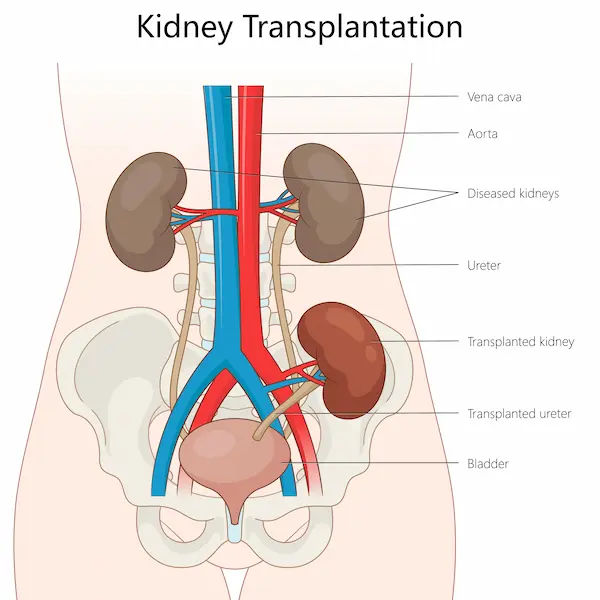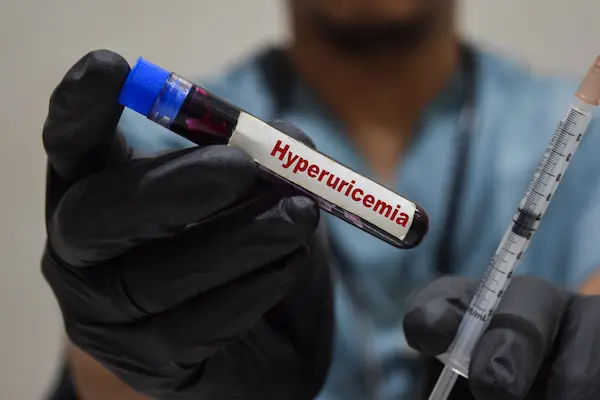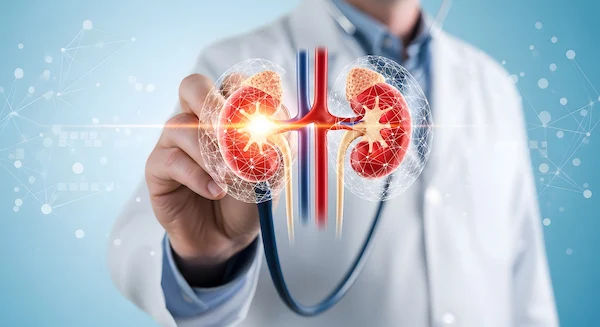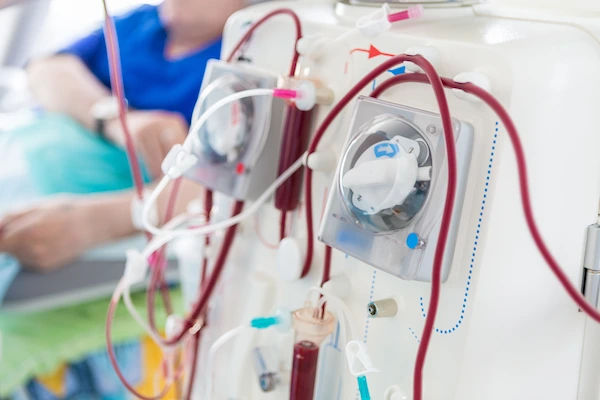Indian Diet Guidelines After Kidney Transplant
Discover essential Indian diet guidelines after a kidney transplant, including tips on protein, sodium, potassium, phosphorus, and food safety to support recovery and kidney health.


A kidney transplant is a life-changing procedure that offers a new lease on life. However, maintaining a healthy diet after the surgery is crucial to ensure your new kidney functions well and keeps you in good health. The right diet helps prevent complications, supports healing, and improves overall well-being. If you or a loved one has undergone a kidney transplant, this guide will help you understand the dietary changes needed for a smooth recovery and long-term health.
Why Is Diet Important After a Kidney Transplant?
After a kidney transplant, your body adjusts to the new organ while taking immunosuppressant medications to prevent rejection. These medications can affect your metabolism, blood sugar, cholesterol, and weight. A balanced diet helps:
- Promote healing and recovery
- Maintain a healthy weight
- Control blood pressure and blood sugar
- Prevent infections and complications
- Strengthen immunity
Consult Top Nephrologist
Key Dietary Guidelines After a Kidney Transplant
1. Protein for Healing and Strength
Protein is essential for tissue repair and muscle strength after surgery. However, too much protein can strain the kidneys.
What to Eat:
- Lean meats (chicken, fish, eggs)
- Dairy (low-fat milk, yogurt, paneer)
- Plant-based proteins (tofu, lentils, beans in moderation)
Limit:
- Red meat (mutton, pork, beef)
- Processed meats (sausages, bacon)
2. Control Sodium (Salt) Intake
High sodium can raise blood pressure, which is harmful to your new kidney.
What to Do:
- Use herbs and spices (turmeric, cumin, coriander) instead of salt
- Avoid packaged snacks, pickles, and processed foods
- Rinse canned vegetables to remove excess salt
Avoid:
- Chips, papads, salted nuts
- Fast food and restaurant meals (high in hidden salt)
3. Manage Fluid Intake
Your doctor will guide you on how much water to drink daily. Too much fluid can cause swelling, while too little can lead to dehydration.
Tips:
- Drink small amounts throughout the day
- Include hydrating foods (cucumber, watermelon)
- Limit caffeine and sugary drinks
4. Watch Your Potassium Levels
Immunosuppressants can affect potassium levels. Too much potassium can be dangerous.
Safe Choices:
- Apples, pears, papaya, guava
- Bottle gourd (lauki), cabbage, green beans
Limit High-Potassium Foods:
- Bananas, oranges, coconut water
- Potatoes, tomatoes, spinach
5. Monitor Phosphorus Intake
Medications after a transplant can increase phosphorus levels, weakening bones.
What to Eat:
- Egg whites, white rice, refined grains
Limit:
- Dairy (if phosphorus is high)
- Nuts, seeds, whole grains
6. Healthy Fats for Heart Health
Immunosuppressants can raise cholesterol levels.
Good Fats:
- Olive oil, mustard oil, avocados
- Nuts (in small amounts)
Avoid:
- Fried foods, butter, ghee (in excess)
7. Control Sugar Intake
- Some medications increase the risk of diabetes.
Tips:
- Choose whole fruits over juices
- Avoid sweets, sugary drinks, and desserts
8. Food Safety to Prevent Infections
Your immune system is weaker after a transplant, so food hygiene is crucial.
Do’s:
- Wash fruits and vegetables thoroughly
- Cook meat and eggs properly
- Drink boiled or filtered water
Avoid:
- Raw or undercooked foods (sushi, half-boiled eggs)
- Street food and unpasteurized dairy
Sample Indian Meal Plan After Kidney Transplant
Here is an example for Indian meal plan to be taken after kidney transplant,
Breakfast:
- Poha (flattened rice) with veggies + 1 boiled egg OR Idli with coconut chutney
Mid-Morning Snack:
- Apple or pear slices OR Buttermilk (unsalted)
Lunch:
- 1 roti (whole wheat if allowed) + rice
- Dal (moong or toor) + lauki sabzi
- Curd (low-fat)
Evening Snack:
- Roasted makhana (fox nuts) OR Sprouted moong salad
Dinner:
- Jeera rice + fish/chicken curry OR Khichdi with bottle gourd
Before Bed:
- Warm turmeric milk (if allowed)
Lifestyle Tips for Better Recovery
Recovery plays a major role after kidney transplant and here are some tips,
- Exercise Regularly – Light walking, yoga, or stretching helps maintain weight and energy levels.
- Take Medications on Time – Never skip immunosuppressants.
- Regular Check-ups – Monitor kidney function, blood sugar, and blood pressure.
- Avoid Alcohol & Smoking – They can harm your kidney and interact with medications.
When to Consult a Doctor?
If you experience:
- Sudden weight gain (fluid retention)
- High blood pressure
- Uncontrolled sugar levels
- Frequent infections
Book a consultation with a nephrologist or dietitian at Apollo 24|7 for personalized advice.
Conclusion
A kidney transplant is a second chance at life, and a healthy diet plays a big role in keeping your new kidney functioning well. By following these guidelines, staying hydrated, and maintaining regular check-ups, you can enjoy a healthier, happier life post-transplant.
Consult Top Nephrologist
Consult Top Nephrologist

Dr. Pardha Saradhi
Nephrologist
9 Years • MBBS, MD-DNB (Gen. Med.), DNB (Nephro)
Hyderabad
Apollo Hospitals D R D O kanchanbagh, Hyderabad
(75+ Patients)

Dr. Kity Sarkar
Nephrologist
15 Years • MBBS,MD(Genl. Med.), DrNB(NEPHROLOGY)
Kolkata
Dr. Kity Sarkar's Clinic, Kolkata
Dr Gayatri Pegu
Nephrologist
15 Years • MD (General Medicine) DM(Nephrology)
Guwahati
Apollo Clinic Guwahati, Assam, Guwahati
Dr Ch Sashidhar
Nephrologist
20 Years • MBBS, MD General Medicine, DNB, Nephrology
Secunderabad
Apollo Hospitals Secunderabad, Secunderabad

Dr Praveen Kumar Etta
Nephrologist
10 Years • MBBS,MD DM(SGPGI) FORMER ASST(PIMS)
Hyderabad
Apollo Spectra Ameerpet, Hyderabad
Consult Top Nephrologist

Dr. Pardha Saradhi
Nephrologist
9 Years • MBBS, MD-DNB (Gen. Med.), DNB (Nephro)
Hyderabad
Apollo Hospitals D R D O kanchanbagh, Hyderabad
(75+ Patients)

Dr. Kity Sarkar
Nephrologist
15 Years • MBBS,MD(Genl. Med.), DrNB(NEPHROLOGY)
Kolkata
Dr. Kity Sarkar's Clinic, Kolkata
Dr Gayatri Pegu
Nephrologist
15 Years • MD (General Medicine) DM(Nephrology)
Guwahati
Apollo Clinic Guwahati, Assam, Guwahati
Dr Ch Sashidhar
Nephrologist
20 Years • MBBS, MD General Medicine, DNB, Nephrology
Secunderabad
Apollo Hospitals Secunderabad, Secunderabad

Dr Praveen Kumar Etta
Nephrologist
10 Years • MBBS,MD DM(SGPGI) FORMER ASST(PIMS)
Hyderabad
Apollo Spectra Ameerpet, Hyderabad




